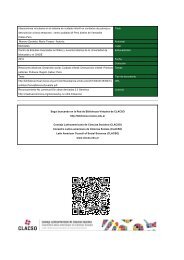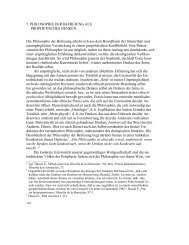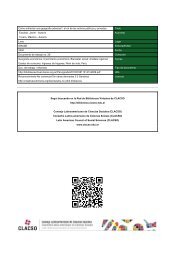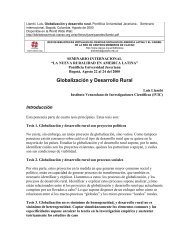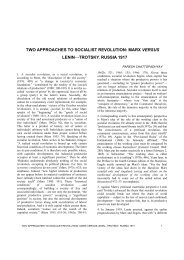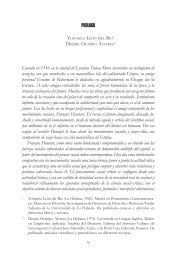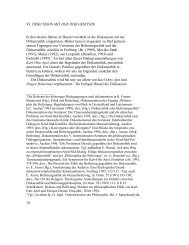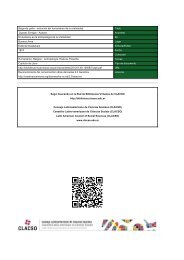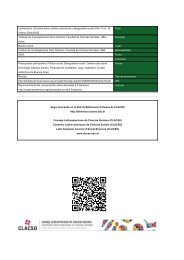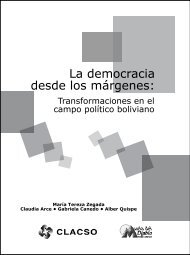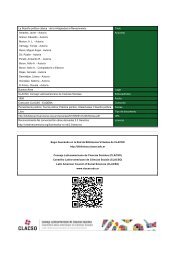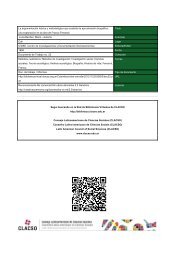1 LOS MACHOS TAMBIEN LLORAN: TELEVISA AND ... - CLACSO
1 LOS MACHOS TAMBIEN LLORAN: TELEVISA AND ... - CLACSO
1 LOS MACHOS TAMBIEN LLORAN: TELEVISA AND ... - CLACSO
Create successful ePaper yourself
Turn your PDF publications into a flip-book with our unique Google optimized e-Paper software.
Perhaps NAFTA's most dramatic aspect was not its economic<br />
impact, since multinational capital had been having its way with<br />
Mexico and the world for quite some time, but rather the death<br />
blow it dealt to the most cherished notion of the post-<br />
Revolutionary Mexican state--that is, the notion of national<br />
sovereignty. When the Mexican government signed the agreement in<br />
spite of its requests for worker protections having been ignored,<br />
it effectively gave up the posture it had maintained, at least<br />
rhetorically, towards the United States for many decades, and<br />
attempted to disguise its complicity in what might be called a<br />
"kinder, gentler" colonialism behind the mask of "modernization."<br />
In terms of consciousness, this forfeiting of the<br />
ideological coherence of the Mexican nation, or mexicanidad,<br />
would seem to inevitably produce the kind of alienation and<br />
fragmentation already associated with the borderlands.<br />
Sociologist Javier Estinou Madrid wrote in his 1993 book La<br />
comunicación y la cultura nacionales en los tiempos de libre<br />
comercio that the commercialization of communications media<br />
ha corrido y anulado con gran rapidez nuestra frontera<br />
ideológica de país, que es el principal dique mental<br />
que nos sirve para sobrevivir como nación....[D]e ahí<br />
que hoy hayamos adquirido otra forma de ver al ser<br />
humano, al mundo, al universo y a la vida, que no son<br />
las bases culturales que nuestra sociedad requiere para<br />
avanzar y crecer con armonía (21).<br />
The same year, Gómez-Peña and Coco Fusco, in program notes for<br />
their performance piece "New World (B)order," summarized the<br />
situation using Roger Bartra's term "desmodernidad": "State of<br />
being without a mother [a play on the word "desmadre"] or living<br />
in permanent chaos."<br />
More recently, Luis González Souza wrote in La Jornada:<br />
Por grotesco que parezca, esa parece ser la discusión<br />
de fondo de nuestros días: ¿queremos que México siga<br />
siendo una nación, sí contrahecha, pero nación nuestra<br />
al fin y al cabo? O por el contrario, ¿queremos de<br />
plano convertir a México en un tianguis, más bien<br />
extranjero y dinamitado por todos lados, donde rija<br />
nada más que la ley del mercado?<br />
Critiquing the current administration's economic policy, González<br />
Souza warns that the neoliberal project only replaces the corrupt<br />
and inefficient mismanagement currently associated with public<br />
enterprises with the even more frightening prospect of an economy<br />
controlled by private and mostly foreign corporations: "una<br />
rectoría en verdad canibalesca." Once again we return to García<br />
Canclini's dilemma: can such a thing as national culture exist in<br />
the era of transnationalization? To which the composer of "Dos<br />
mujeres, un camino," singing from the point of view of<br />
18



